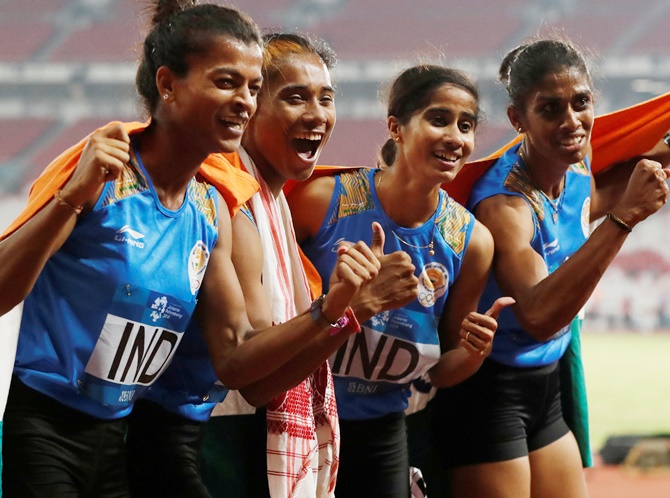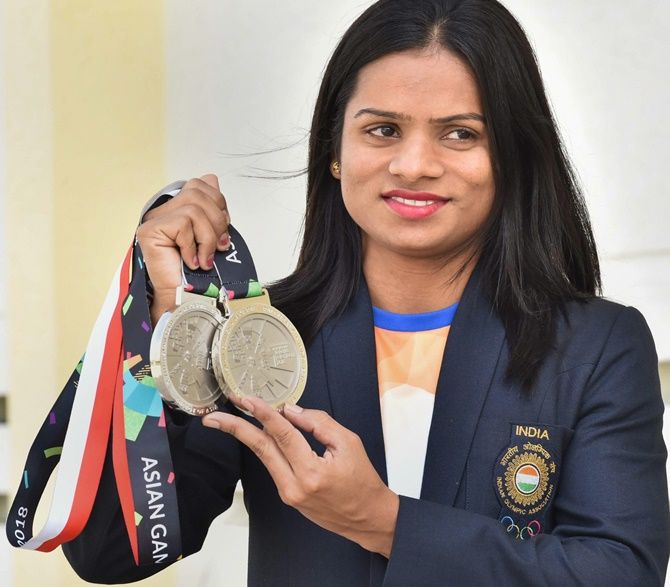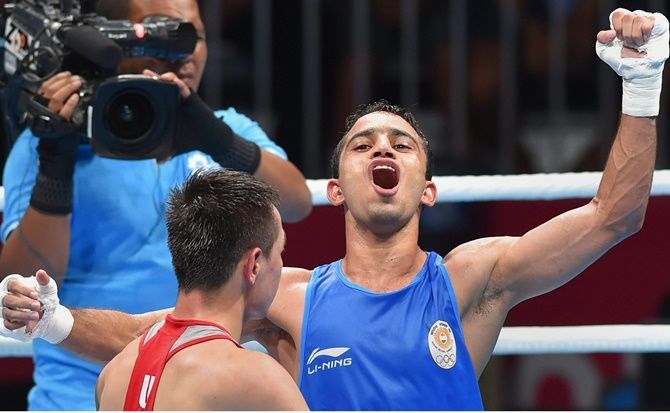
Achievements over the past two weeks, in the world's second biggest multi-sport event, matched India's aspirations and set the country on a road that appears far more promising than the path it has been on for decades.
The best-ever medal haul at the 2018 Asian Games is a leap forward for Indian sport after the Commonwealth Games medal spurt.
In pursuit of excellence in the sporting arena and creating a niche for itself, India never had it so good in the continental showpiece that is considered next only to the Olympic Games.
Even as the medallists come back with a feeling of accomplishment from Jakarta and Palembang, the surge in podium finishes could trigger new passion for Olympic sports in a country so obsessed with cricket.
From teenager Saurabh Chaudhary to 60-year-old Pranab Bardhan, an assortment of athletes combined to produce a top show even as the country endured shocking results in kabaddi and hockey.
With 15 gold, 24 silver and 30 bronze, India's medal tally stood at 69, a step up from Incheon four years ago when they won 65.
India equalled the 15-gold tally of the 1951 inaugural Games but the country had never won 24 silvers before. Overall, India maintained its top-10 rank by finishing eighth yet again.
Every multi-sporting event has witnessed controversies and it was no different this time too.
However, once the action began, it was only the athletes and their performances that took centre stage.
The track and field remained the most productive area for India as seven of the 15 gold came from the Gelora Bung Karno Stadium.
It was the burly Tejinder Pal Singh Toor, who delivered the first athletics gold with a record-breaking throw of 20.75m and later 12-toed Swapna Barman entered the history books by becoming the country's first heptathlete to grab a yellow metal at the Games.

Dutee Chand returned to the track with a bang. Running as if there was no tomorrow, she ended up blazing the track for two silver medals, the one in 100m being India's first in 20 years.
If it was not for superior Africa-origin athletes, representing countries such as Qatar and Bahrain on track, India's gold count would have been bigger.
It was purely for this reason that Hima Das had to be content with a silver in the 200m as she ran alongside Nigerian-born Salwa Eid Naser.
Neeraj Chopra expectedly achieved a super result by becoming the first Indian to win a gold in javelin throw and sprinters Manjit Singh and Jinson Johnson too changed a few statistics with their courageous show.
India's badminton queens Saina Nehwal and P V Sindhu continued to deliver the goods and ensured that the country's 36-year-old wait for an individual medal ends.
Sindhu's silver and Saina's bronze were among the highlights of India's campaign along with the table tennis players' two historic bronze in team events.
Manika Batra was without doubt the biggest star of India's CWG show at the Gold Coast but in Jakarta, winning two bronze in team events by competing against powerhouses like China and Japan is no mean feat. Batra, Sharath Kamal, G Sathian and Harmeet Desai deserve an applause for their effort.
In Palembang, 16-year-old Chaudhary and 15-year old Shardul Vihan showed that India has no dearth of talent even as the other youngsters Manu Bhaker and Anish Bhanwala must be disappointed for not winning a medal.
Saurabh was one of the two gold medallists along with Rani Sarnobat while Shardul won a silver.
Bajrang Punia and Vinesh Phogat performed as if they owned the mat, winning gold medals with sheer domination. But veteran Sushil Kumar and Salshi Malik suffered disappointments.
While there were many moments to rejoice, India's performance in kabaddi and hockey disappointed the fans.
Bridge buddies Bardhan and Shibnath Dey Sarkar won gold in men's pairs and urged fans to not equate their sport with gambling, saying it's a game of intellect.

A gritty Amit Panghal ensured that a medal -- gold -- came from the boxing arena too, the Army man swelling India's tally with a stunning win over reigning Olympic champion on the last penultimate day of the competition.
The recurve archers disappointed with their lacklustre show but their compound teammates made sure that the contingent does nor return empty-handed.
In kabaddi, Iran jolted India twice by taking both and men's and women's top prize. It came as a rude shock as India went into the Games as the continent's powerhouse, having all nine gold medals in the past.
The men's and women's hockey teams being the top-ranked in Asia were also expected to stand on top of the podium but a silver and bronze was all they could manage.
By scoring more than 70 goals in the pool games, India's men's hockey team looked unstoppable before they were halted by Malaysia. The defence choked in the crucial last two minutes and they eventually lost it in sudden death. The team took a bronze by beating Pakistan.
The women's team lost in the final to Japan, who claimed both the gold medals.
The positives far outweigh the disappointments in few events, and the many firsts and many national records that were broken during the Games provide hope for a bright future.












 © 2025
© 2025